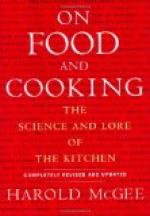MACARONI BAKED WITH GRANOLA.—Break macaroni into pieces about an inch in length sufficient to fill a large cup, and cook until tender in boiling milk and water. When done, drain and put a layer of the macaroni in the bottom of an earthen pudding dish, and sprinkle over it a scant teaspoonful of granola. Add a second and third layer and sprinkle each with granola; then turn over the whole a custard sauce prepared by mixing together a pint of milk, the well beaten yolks of two eggs or one whole egg, and one-fourth of a teaspoonful of salt. Care should be taken to arrange the macaroni in layers loosely, so that the sauce will readily permeate the whole. Bake for a few minutes only, until the custard has well set, and serve.
EGGS AND MACARONI.—Break fifteen whole sticks of macaroni into two-inch lengths, and put to cook in boiling water. While the macaroni is cooking, boil the yolks of four eggs until mealy. The whole egg may be used if caught so the yolks are mealy in the whites simply jellied, not hardened. When the macaroni is done, drain and put a layer of it arranged loosely in the bottom of an earthen pudding dish. Slice the cooked egg yolks and spread a layer of them over the macaroni. Fill the dish with alternate layers of macaroni and egg, taking care to have the top layer of macaroni. Pour over the whole a cream sauce prepared as follows: Heat one and three fourths cup of rich milk to boiling, add one fourth teaspoonful of salt and one heaping spoonful of flour rubbed smooth in a little cold milk. Cook until thickened, then turn over the macaroni. Sprinkle the top with grated bread crumbs, and brown in a hot oven for eight or ten minutes. Serve hot.
TABLE TOPICS.
Sir Isaac Newton, when writing
his grail work, “Principia,” lived
wholly upon a vegetable, diet.
ROBERT COLLYER once remarked; “One great reason why I never had a really sick day in my life was that as boy I lived on oatmeal and milk and brown bread, potatoes and a bit of meat when I could get it, and then oatmeal again.”
HOT-WEATHER DIET.—The sultry period of our summer, although comparatively slight and of short duration, is nevertheless felt by some people to be extremely oppressive, but this is mainly due to the practice of eating much animal food or fatty matters, conjoined as it often is with the habit of drinking freely of fluids containing more or less alcoholics. Living on cereals, vegetables, and fruits, and abstaining from alcoholic drinks, the same persons would probably enjoy the temperature, and be free from the thirst which is the natural result of consuming needlessly heating food.—Sir Henry Thompson.
Mistress (arranging
for dinner)—“Didn’t the macaroni
come from
the grocer’s, Bridget?”
Bridget—“Yis,
mum, but oi sint it back. Every won av thim leetle
stims wuz impty.”




